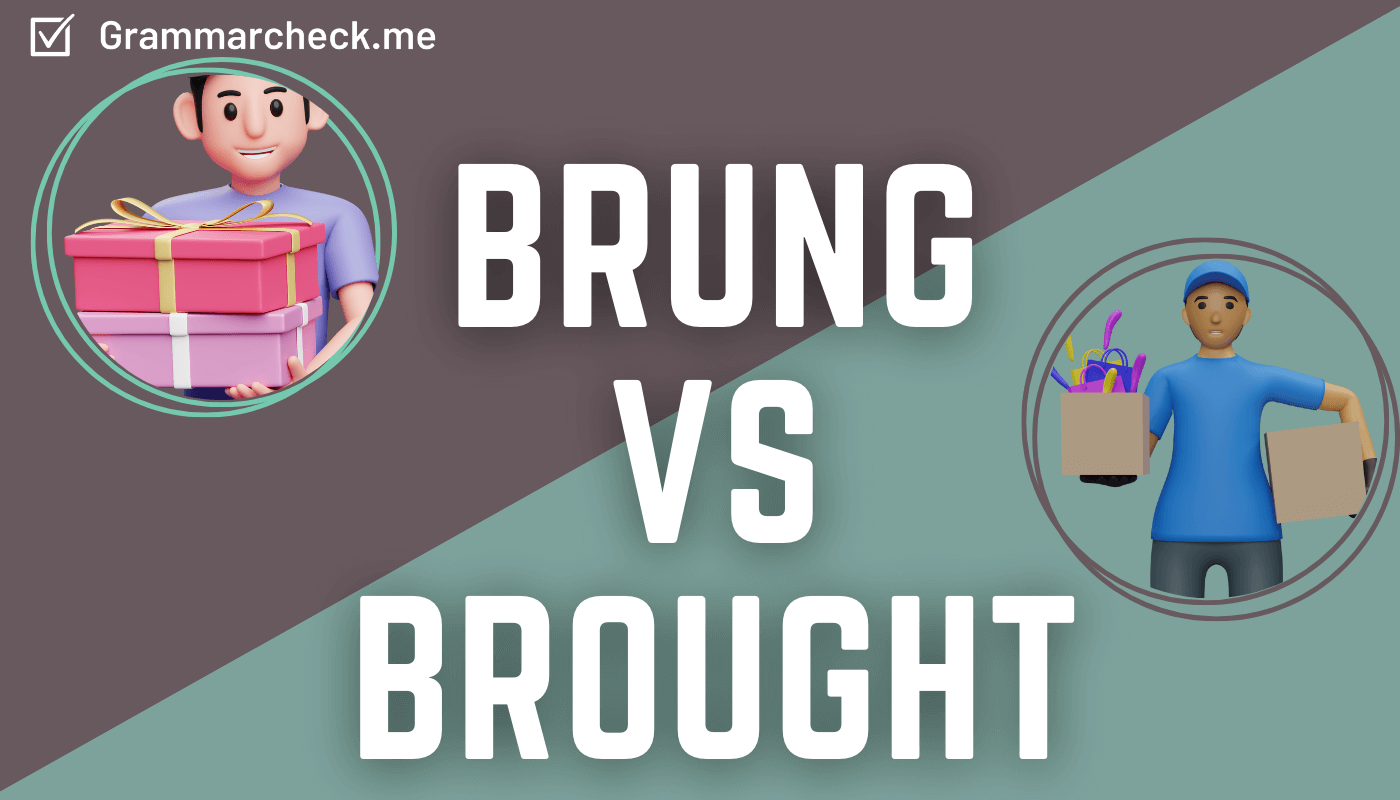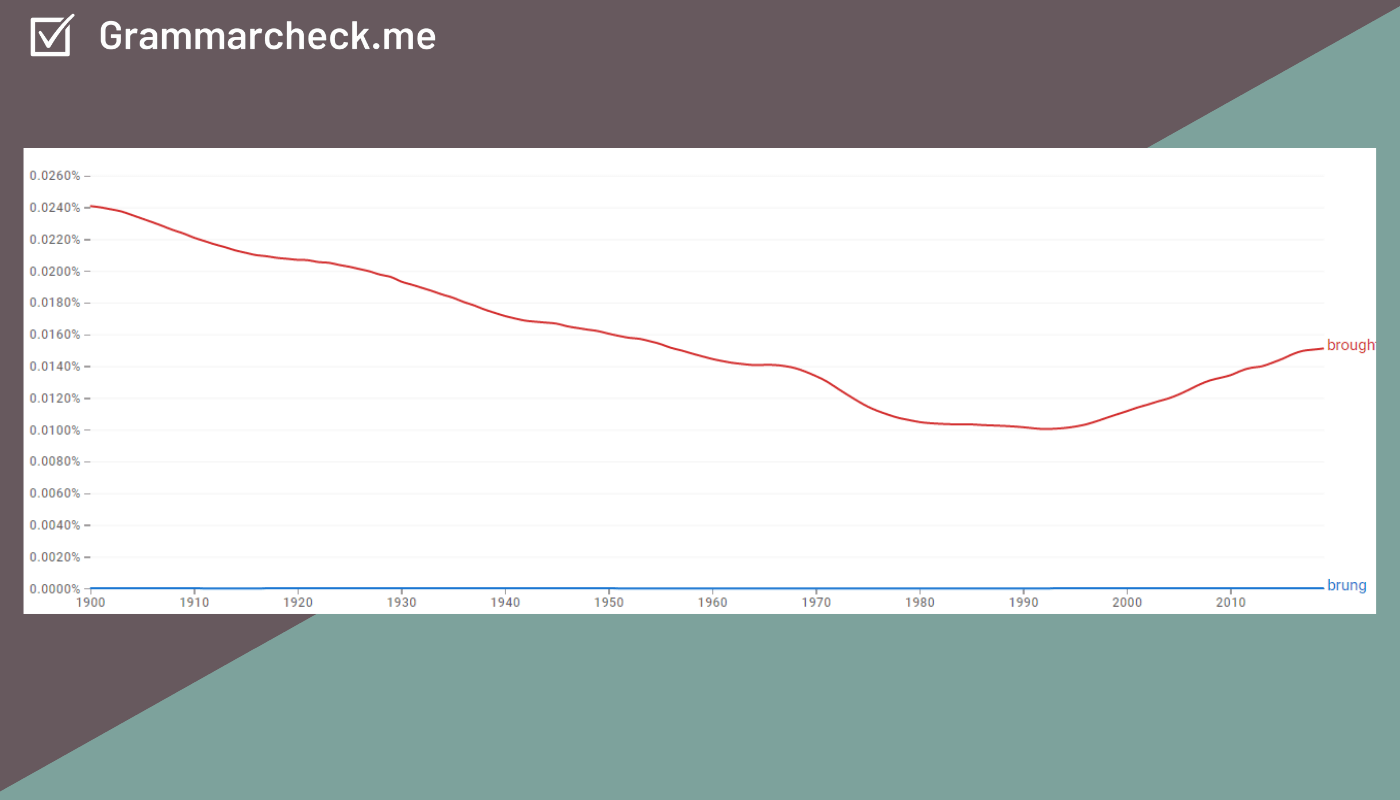There are many words in the English language which sound very similar but have different meanings! The words brung and brought are a perfect example of such a situation. In this post, we’re going to break down both spellings in detail and provide some helpful tips for learning when it’s appropriate to use each one. Read on to learn more about the difference “brung” vs. “brought”.
Which Is Correct: Brung or Brought?

Takeaway: Brought is the correct spelling. Brung is an improper variation of the past tense word brought.
It is easy to see why this is confusing, after all, there are plenty of irregular verbs in the English language. And just like we saw in our post about the words Tomatos vs Tomatoes, we found that just because a word is popular does not mean it is correct!
But in this case, brought is the past tense of bring.
You may hear people use the word “brung” in casual & informal conversation. For example, “I brung the beer to the party last time!” This does NOT mean it is correct. However, there is no need to correct friends & family in such an informal context. “Brung” should NOT be used in Academic writing or other professional contents.
How To Use Brought
As we already mentioned, “brought” is the past tense form of “bring”. If you wanted to talk about something that you had to provide or carry in the past, you would use “brought”.
- “I brought cupcakes to the party last night”
- “She brought her dog with her to the park”
Just like the phrase “paid attention“, the word brought is used to indicate a past action. You could not use it to indicate a future action.
Incorrect: “I am going to brought snacks over before the football game starts.”
Sentence Examples
Here are some sentence examples that demonstrate how to use the past participle “brought“.
- The storm brought high winds and heavy rains.
- The new law brought about many changes.
- She brought her dog to the park.
- He brought his team to victory.
- They brought their luggage with them on the trip.
Just remember to focus on spelling! We saw in our post about how to spell using that writers often mess up on simple terms!
How To Use Brung
As we already mentioned, “brung” is not technically correct grammar. The correct past tense of “bring” is “brought.”
However, “brung” has been used colloquially in certain dialects and regions, particularly in the southern United States. Just like the phrase “catch you on the flip side“, using the word brung is considered slang and should only be used in casual conversation with friends.
Popularity Analysis

By reviewing Google’s Ngram data, it is obvious that “brought” is the far more popular word choice! And this makes sense because it is the correct spelling.
Personally, I’ve used both in my lifetime, but in formal writing you should always use “brought”. However, just like we saw in our comparison of the words Ol’ vs Old, even slang terms can become extremely popular in published writing!
Is Brang A Word?
“Brang” is not technically a word in standard English. Just like “brung”, it is considered a dialectal variation of the past tense of “bring”. It seems to be used more popularly in the southern United States.
- Incorrect: “She brang the equipment last week. It’s your turn now!”
If you’re trying to write a formal document or in a business setting, it’s best to avoid using “brang” and stick with standard English spelling. This is very similar to what we saw in our analysis of the word ammount! People often try to use misspelled words in formal writing!
Frequently Asked Questions
Brought is the standard past tense form of the verb bring. Although brung us often used in casual speech in certain regional dialects, it is not technically an English word.
Brung is an improper past participle form of the verb to bring.
Yes, brung is past tense. However, brought is the correct spelling. For example “I brought my books home from school so that I could study”.
Both can be correct depending on the context! The phrase “I bought” means that you paid for goods or services. However, the phrase “I brought” means that you carried or transported something from one location to another.
The Bottom Line
By now you should be an expert on the differences between brung vs brought. So when someone asks, is brung a word? You know the answer is NO! Brought is the correct past participle form of the verb bring. Remember, just because people use a term in casusal conversation does not mean it is correct grammar! If you need more help with spelling rules like this consider using our spell and grammer check tool to make things much easier!
